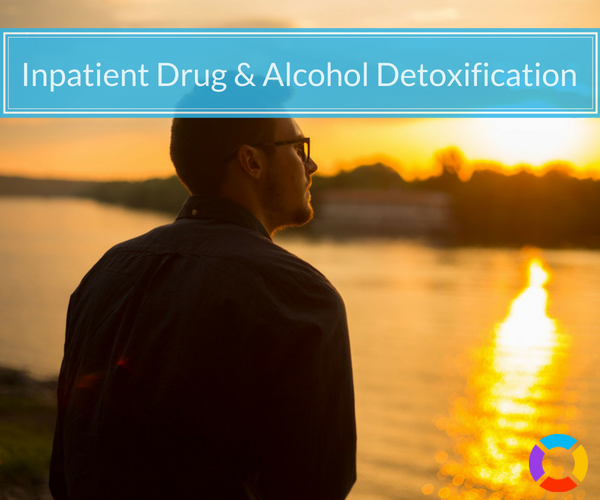What to Expect at Inpatient Detox Centers for Alcohol and Drugs

For individuals with alcohol and substance use disorders, medically supervised inpatient detox and drug rehab is often the safest and most effective start toward a future in recovery. This is especially important when you consider that the Centers for Disease Control and the National Survey on Drug Use and Health reported that 17.1% of Americans aged 12 and older had substance use disorders in 2023.
Addictions have devastating consequences, but they can be overcome. Medical detox is the first step for many people.
What is Inpatient Detox?
Inpatient substance abuse treatment assists individuals with alcohol, opioid, and benzodiazepine addictions. Detox is the first part of this treatment. It is the process of removing the abused substances from their bodies, managing withdrawal symptoms and supporting stabilization under 24/7 medical supervision. For many individuals, this is the right direction towards a long recovery.

During inpatient detoxification, individuals follow a structured schedule of meals, therapies, and counseling sessions. Unlike outpatient detox, individuals reside at the treatment center throughout the process.
Supervised medical care enables close monitoring of withdrawal symptoms. This includes vital signs and overall physical and mental wellbeing in a safe and comfortable environment. This is most commonly used for individuals with moderate to severe addictions.
Take the first step toward recovery today!
What to Expect During Inpatient Detox
Individuals in inpatient detox remain at the treatment center throughout the process. This includes the initial intake and assessment, induction, stabilization, maintenance or weaning and transitioning to rehab.
Intake and Assessment
Intake is the first step in the process. Newly admitted individuals receive full evaluations, including their substance use histories, past medical histories and be assessed for any co-occurring mental health disorders.
Managed Withdrawal
Following their initial intake and assessment, clients will proceed into the active phase of medical treatment. At this point, they’ll begin receiving FDA-approved medications to support them through the detox process.
Residents are given medications to reduce withdrawal symptoms and help stabilize their physical and mental well being. They also begin behavioral therapies that usually include cognitive behavioral therapy (CBT), contingency management, motivational enhancement therapy, and individual and family counseling.
Transitioning to Rehab
Detox doesn’t support long term recovery by itself. Individuals need to transition into a treatment program with continued inpatient therapy or an outpatient program such as a partial hospitalization (PHP) or intensive outpatient levels of care.
Medication Assisted Treatment (MAT)
The use of FDA-approved medications to manage cravings, reduce withdrawal symptoms and reduce the risk of relapse may extend beyond the detox phase. Medication assisted treatment (MAT) is a proven protocol for persons in alcohol or opioid recovery.
MAT typically begins soon, if not immediately, after the client completes detox. Treatment may also involve some of the same medications used during detox, but at different dosages. Unlike detox, MAT may continue for weeks, months or even years, depending on the client’s unique recovery needs and goals.
Like detox, MAT also involves multiple stages: induction, stabilization, and maintenance.
Induction
During the induction phase, FDA-approved medications are introduced to manage clients’ symptoms and reduce their cravings for drugs or alcohol. This reduction of physical and psychological symptoms helps clients focus on their recovery, allowing clients to focus on their mental health and the development of critical recovery skills.
Induction often involves close medical monitoring as the client’s healthcare team determines what medication(s) and dosages best serve the client’s needs.
Stabilization
Stabilization entails the continued use of supportive medications and continued therapies. This step may last for a few days or weeks as clients learn to integrate their medications into a larger recovery program.
The process of stabilization depends on the severity of your withdrawal symptoms. During the stabilization phase, you should begin to see consistent relief in your psychological and physiological symptoms as you adapt to your medication regime.
Maintenance or Weaning
This step looks different for each person. For some, the continued use of medication assisted treatment (MAT) is a critical part of their individualized treatment plans and long term recovery.
Others may not need continued meds and may be weaned off their prescriptions under medical supervision within a few weeks. It’s important to note, though, that tapering off these pharmaceuticals should be attempted only under close medical supervision.
Take the first step toward recovery today!
Levels of Care in Inpatient Detox Centers
There are three levels of care in an inpatient detoxification program. The proper level of care is determined by the American Society of Addiction Medicine (ASAM) criteria for placement. The levels of consist of the following:
Level lll. 2-D Clinically Managed Residential Detoxification
- Also known as “social detoxification.”
- A physician completes the evaluation and recommends a treatment plan. Other clinical staff including nurses or technicians implement the plan and manage orders.
- Care is available throughout the day and night.
- Support is primarily given by peers or other social support systems.
Level lll. 7-D Medically Monitored Inpatient Detoxification
- “Medically monitored” refers to clinical observation during detox.
- Clinical staff supervises care and provides medication when indicated.
- Care is given day and night.
- Support is administered by licensed or credentialed staff and peer or other social support systems.
Level IV-D Medically Managed Intensive Inpatient Detoxification
- Offers access to doctors 24 hours a day.
- Nurses provide frequent assessment and monitoring of vital signs and condition changes.
- Medications are administered as ordered by the physician.
Who Should Consider Inpatient Detox?
Individuals who abuse substances like alcohol, benzodiazepines and opioids often experience withdrawal symptoms when they try to quit. For some people, withdrawal is uncomfortable and dangerous. This is especially true for those with moderate to severe addictions, taken substances for a long period or have co-occurring medical or mental health disorders.
Inpatient detox and treatment centers offer medical intervention and close monitoring in safe and supportive environments.
Who Isn’t Getting the Inpatient Detox They Need?
Unfortunately, not everyone who needs inpatient detox gets the treatment they need. According to the Substance Abuse and Mental Health Services Administration (SAMHSA), only 14.6% of those with substance use disorders received treatment in 2023, and only 18% who would benefit from MAT received medication.
Distribution of care is also unequal. Women, adolescents, BIPOC, incarcerated persons and veterans usually experience the greatest treatment gap.
Factors that contribute to treatment gaps for inpatient detox include the following:
- Living in rural areas, a lack of treatment facilities, and qualified medical providers.
- Financial difficulty, lack of insurance coverage or denial of services.
- Not enough treatment facilities throughout the U.S., including specialized programs and qualified addiction professionals.
- Lack of funding for substance misuse programs.
- Childcare needs that often interfere with treatment schedules.
- Stigmas surrounding substance use treatment.
How Long Does Inpatient Detox Last?
The time it takes to detox depends on several factors. These include the substance(s) used, the severity of withdrawal symptoms, the duration and frequency of use, age and gender, comorbid conditions and the person’s overall physical health.
Alcohol
- Withdrawal symptoms typically start within a few hours after the last drink.
- Detox takes on average two to seven days.
Opioids
- Withdrawal symptoms from short acting opioids typically start within 8-24 hours after last use. For long acting opioids, withdrawal symptoms typically begin 12-48 hours after last use.
- Detox for short-acting opioids takes an average of 4-10 days.
- Detox for long-acting opioids can take 10-20 days.
Benzodiazepines
- Withdrawal symptoms typically start within 1-4 days after the last dose.
- Detox takes around 10-14 days.
Inpatient Detox Protocols and Medications Used
The withdrawal and detox process is dangerous, depending on the substance used. It can also be mentally and physically uncomfortable.
For these reasons, inpatient detox is a crucial component of recovery.
The use of MAT can make long-term recovery easier by managing withdrawal symptoms, reducing cravings and lessening the risk of relapse. These FDA-approved medications include:
Alcohol
- Naltrexone
- Acamprosate
Opioids
- Buprenorphine XR or Sublocade
- Buprenorphine-naloxone or Suboxone
- Naltrexone or ReVia in oral form, Vivitrol in intramuscular injection
- Methadone
Benzodiazepines
- Flumazenil (Not FDA-approved)
What Happens After Inpatient Detox?
For many individuals, detox is the first step towards recovery. After detox, individuals usually transition to residential treatment or an intensive outpatient program (IOP) to address the root causes of the problem, learn healthy coping skills and develop a relapse prevention plan.
Inpatient residential rehab typically ranges from 30-90 days. Residents reside at the treatment facility and receive a structured daily schedule with activities ranging from individual and group counseling, experiential and recreational therapies, nutrition counseling, family therapy and medication.
Call to learn more about your addiction treatment options.
An IOP allows for individuals to live at home and attend treatment at a facility, usually several days per week and totaling between 9-20 hours of treatment per week.
During IOP, individuals participate in individual and group therapy and support groups that develop healthy coping skills, receive education on addiction, family therapy and relapse prevention planning. Most IOPs last around 90 days.
Whether your program is conducted at an inpatient drug rehab or via an IOP, completing comprehensive treatment and participating in aftercare programs is the best way to ensure recovery.
Find an Inpatient Detox Center Near You
There are several ways to connect with inpatient detox centers near you. Your healthcare provider is a useful resource in locating the appropriate services to meet your needs.
The internet is also a good resource for finding the care you need. Detox.com can direct you to programs and services in your area. Additionally, the SAMHSA provides online databases that connect you with facilities that offer inpatient detox and addiction treatment.

Detox and treatment centers can help you determine insurance coverage and any out-of-pocket expenses incurred during your stay. Individuals without insurance should speak with customer service representatives to learn if there are scholarship opportunities, a sliding scale fee or alternative ways to pay for treatment. Some staffers even help you to apply for government insurance such as Medicaid or Medicare.
It’s important to remember that you’re not alone. Take the first step toward a future in recovery. Make the call today, you won’t regret it!
FAQs
Detox focuses on the process of ridding the body of drugs and/or alcohol by monitoring for and managing any withdrawal symptoms. Detox prepares you for rehab.
Rehab is the follow up to detox. Rehab addresses the underlying cause of substance use disorders and offers support and strategies that focus on long term recovery.
Yes, you can go through medical detox without insurance. An inability to pay should never keep you from getting the help you need. There are many programs that offer free services, sliding scale payment plans and alternative ways to pay.
Yes. In fact, for individuals with moderate to severe alcohol addiction, inpatient detox is often recommended. After detox, inpatient alcohol rehab may offer medication assisted treatment that may include the use of FDA-approved medications to curb cravings. Clinical staff is there to monitor for any adverse physical and mental reactions to the process and provide interventions to help you through them.
Call today. Begin your recovery!
Choosing inpatient detox and ongoing addiction treatment lays a foundation for a future in recovery. Make the call. It can be the best life saving and certainly life-changing decision you’ll ever make.

